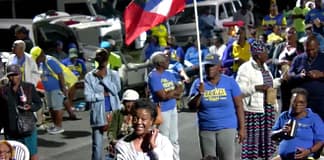
Part l- Let the Family Grieve: A Call for Compassion in the Wake of Adrianna Younge’s Death
By Pastor Stanton Adams
In moments when grief echoes through a nation, we are confronted not only by loss but by the full weight of our shared humanity. The tragic and still-unresolved death of young Adrianna Younge has left Guyana, both within its borders and across its global diaspora, suspended in sorrow, trembling in confusion, and aching for clarity. Her life, brief yet luminous, has ignited a collective cry for truth. But beneath the thunder of questions and the storm of opinions, there lies a quieter and more sacred appeal. Let the family grieve.
Grief, when allowed its natural course, performs a sacred function. It gives love the language it needs when words fall short. It helps the soul steady itself after being struck by the unbearable. And it prepares the wounded heart to eventually live again, not in denial of the loss, but in honor of the one who is gone. This process does not obey timetables, nor does it conform to the expectations of distant observers. When some voices suggest that friends should simply move on or imply that the family seeks to benefit from Adrianna’s passing, such statements are not merely heartless. They are culturally ignorant and psychologically reckless.
In Guyanese culture, mourning is woven into the social and spiritual fabric of community life. Grief here is not hidden. It is sung out loud, wept in the open, shared in prayer, remembered through story. It flows through vigils, echoes in hymns, and finds expression in the quiet presence of neighbors bearing warm food and tender silence. Funerals are not events to be checked off, but sacred acts of remembrance and resistance. They declare that the life lost still matters. In this cultural context, grief is not rushed. It is not polite. It is not clean. It is communal. And to demand that this process be abbreviated or subdued is to dishonor a legacy of generational resilience and spiritual dignity.
The grief that Adrianna’s loved ones are experiencing falls well within the boundaries of what scholars understand as ordinary or constructive grief. According to leading researchers such as Dr George Bonanno and Dr Katherine Shear, the death of a child ranks among the two most devastating losses, the other being the death of a spouse. The mourning that follows such a loss often stretches from twelve to twenty-four months, not because of dysfunction, but because of love. Constructive grief is marked by intense emotion, but also by the ability to find connection, memory, ritual, and meaning over time.
Pathological grief, or what is now clinically referred to as Prolonged Grief Disorder, is a different matter. Dr Holly Prigerson, a renowned researcher in the field, defines it as a persistent, pervasive grief response marked by an inability to adapt to the loss, typically lasting beyond a year and accompanied by intense longing, emotional numbness, and functional impairment. Such grief becomes a clinical concern only when the mourner remains trapped in a state of immobilizing despair. There is no evidence that Adrianna’s family or friends are experiencing this. They are responding in the way any loving, healthy family would, aching, remembering, holding on, and gradually learning to let go, all while walking through the valley of shadows with trembling faith.
What deepens the wound is the trauma wrapped around this tragedy. The conflicting autopsy reports, one suggesting drowning, another hinting at potential criminal wrongdoing, have stirred public outrage and ignited a firestorm of speculation. The political climate, already charged by looming national elections, has only intensified the glare. In this emotionally combustible environment, it is more important than ever that we temper our tone. Let us not weaponize grief. Let us not mistake pain for publicity. Let us not turn a family’s mourning into public sport.
Healing, both personal and national, demands sacred space. It demands room for silence and ritual, time for tears, freedom for questions. It calls for less noise and more presence. Justice must be pursued with integrity, not incited by theatrics. Accountability must be demanded without stripping away the dignity of the bereaved.

Therapeutically, those who care must become quiet companions. They must learn to say less and support more. They must allow the family to feel what they feel, to move at the speed of sorrow, not the rhythm of opinion. Pastorally, this is the hour to minister through stillness, to create spaces where mourning is neither corrected nor interrupted, but held with reverence. The nation needs answers, yes, but the family needs space. These needs are not in conflict. They are both necessary and holy.
Adrianna Younge’s death is not a footnote in a news cycle. It is a profound and personal devastation. Though it stirs the heart of a nation, it belongs first to those who knew her laugh, felt her hugs, and dreamed her future. Their grief is not for public permission. Their silence is not weakness. Their sorrow is not failure. It is sacred.
Let the darn family grieve. Let them remember. Let them breathe.
Pastor Stanton Adams serves as the Family Ministries Director for the South Leeward Conference. With more than thirty-six years of pastoral ministry, he brings a blend of seasoned experience and gentle wisdom to those navigating life’s most painful passages. He is currently pursuing a PhD in grief and trauma psychology, exploring the deep intersections of culture, faith, and bereavement in Caribbean communities. Pastor Adams is dedicated to elevating the voices of the grieving with empathy, clarity, and spiritual depth that both comforts and convicts.
Adrianna Younge’s Family: A Case for the Grieving Process (Part II)
By Pastor Stanton Adams
“Grief is not a disorder, a disease or a sign of weakness. It is an emotional, physical and spiritual necessity, the price we pay for love.” Earl Grollman
In the wake of young Adrianna Younge’s tragic passing, we are not only facing the loss of a child but confronting a wound that ripples across an entire nation. This is at once a family’s heartbreak and a community’s shared sorrow. Caribbean life is tightly woven with threads of family, faith, folklore and village spirit. When one child is taken, the whole fabric trembles. As a Caribbean proverb reminds us, “When the roots are deep, there is no reason to fear the wind.” Yet even the deepest roots can quiver under such an unbearable storm.
The loss of a child is unlike any other grief. The death of a parent, though painful, often follows the expected rhythm of life. But the death of a child rewrites everything. It is emotionally paralyzing, spiritually disorienting and physically draining. To fully grasp the devastating impact of such loss, one must understand the meaning of attachment. As human beings, we form deep emotional bonds whether through parental connection, the parent-child relationship or sibling ties as John Bowlby emphasized in his groundbreaking work. When these bonds are broken by death, the psychological and spiritual rupture is profound.
Psychologist George Engel once noted that losing someone to whom you are deeply attached is as traumatic to the mind as a gunshot is to the body. Still, many urge grieving parents to “move on.” But grief is not a shortcut or a sprint. It is a winding road that must be walked, sometimes slowly, sometimes in silence, always with care. As Psalm 23 reminds us, “Even though I walk through the valley of the shadow of death, I will fear no evil.” That valley is not to be avoided. It is to be walked through, not sprinted across.
Adrianna’s death has left echoes not only in her home but across playgrounds, classrooms, Sunday School benches and Sabbath School classes. Her siblings may now cry more, sleep less, fear the dark and ache for the presence of the sister they loved. Children in the community may become withdrawn or unusually fearful. These are not misbehaviors. They are signs of invisible wounds. Their healing requires trained eyes, tender hearts and time. Barry Chevannes, the Jamaican sociologist, once observed, “The family is the bedrock of Caribbean civilization.” If grief is ignored, that bedrock begins to erode. If nurtured, it can transform into something more resilient and deeply rooted.
There is a sacred truth we must embrace. Faith does not erase grief. Even Jesus wept. The tears of the faithful are no less real than those of the hopeless. In fact, our faith gives us permission to mourn deeply and honestly. As theologian Nicholas Wolterstorff wrote after the death of his son, “The wounds of the soul are like the wounds of the body. They need time to heal and clean places to bleed.” Let our churches and communities become those clean places, safe, still and honest spaces where sorrow is not silenced but seen.
Too often we fall into what psychologists call disenfranchised grief, where people are expected to suffer quietly or worse, appear strong and unfazed. But strength is not found in pretending the pain does not exist. It is found in allowing it to be seen, shared and slowly soothed. As Caribbean people, we know how to gather for joy. Now, we must also learn how to gather for grief. Let the rhythm of empathy be louder than the rhythm of judgment. Let us weep with those who weep, not rush them toward recovery, but gently walk beside them.
As we carry this burden together, two paths forward shine clearly. First, if you know someone who is grieving, offer your presence before offering your advice. Sometimes love is found not in what we say but in the silent comfort of being near. Second, let us advocate for trauma-informed care in our schools, churches and communities. Children, like adults, need spaces where their pain is honored and understood.
Grief is love’s echo. Let us ensure that the echo of Adrianna’s life continues not in silence, but in compassion, justice and gentle remembrance.
Pastor Stanton Adams brings over thirty-six years of pastoral ministry to the table alongside his current doctoral studies in grief and trauma psychology. As Family Ministries Director for the South Leeward Conference, he has walked with countless families through valleys of heartbreak and moments of healing. His ministry is built on one enduring truth: no matter how complex the crisis, God’s grace is always sufficient and love remains our greatest calling.
Advertise with the mоѕt vіѕіtеd nеwѕ ѕіtе іn Antigua!
We offer fully customizable and flexible digital marketing packages.
Contact us at [email protected]

















It’s her death or it’s her MURDER?!!!
It’s not her death, but it’s her MURDER!!!!
POOR people feel it the most and there is no one to stand with, for or by you in this time that comes with great CONCERNS instead the mass has time to organized and plan some of the HUGEST of entertainment and WALK but not to organized and walk of this lil girl because she’s not of any ELITES or of any of the rich and wealthy family that attract there entry of and for HANDOUTS plus FAVORS to give out!!!
Isn’t murder death, ? The family knows that she was murdered. The pastor knows what he said. So please allow the family to greave in peace.
Adriana’s death has reached worldwide because of the circumstances leading to her death. And how so much is done to apparently cover it up, such as bringing in a retired Canadian cop (who is accountable to no police agency) to review something when there’s calls for foreign police assistance.
Comments are closed.